
"Me and Bobby McGee" is a song written by American singer-songwriter Kris Kristofferson and originally performed by Roger Miller. Fred Foster shares the writing credit, as Kristofferson wrote the song based on a suggestion from Foster. A posthumously released version by Janis Joplin topped the Billboard Hot 100 in 1971, making the song the second posthumously released No. 1 single in U.S. chart history after "(Sittin' On) The Dock of the Bay" by Otis Redding. Gordon Lightfoot released a version that reached number 1 on the Canadian country charts in 1970. Jerry Lee Lewis released a version that was number 1 on the country charts in December 1971/January 1972 as the "B" side of "Would You Take Another Chance on Me". Billboard ranked Joplin's version as the No. 11 song for 1971.
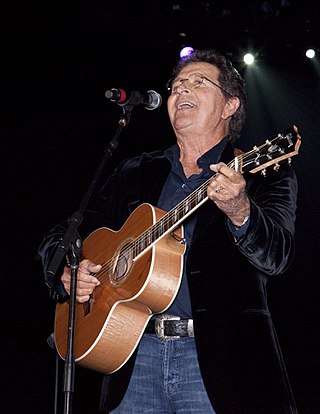
Morris Mac Davis was an American songwriter, singer, performer, and actor. A native of Lubbock, Texas, he enjoyed success as a crossover artist, and during his early career he wrote for Elvis Presley, providing him with the hits "Memories", "In the Ghetto", "Don't Cry Daddy", and "A Little Less Conversation". A subsequent solo career in the 1970s produced hits such as "Baby Don't Get Hooked on Me". Davis also starred in his own variety show, a Broadway musical, and various films and TV shows.

"Since I Don't Have You" is a song written and composed by Jackie Taylor, James Beaumont, Janet Vogel, Joseph Rock, Joe Verscharen, Lennie Martin, and Wally Lester. It was first a 1958 hit single for the doo-wop group the Skyliners on the Billboard Hot 100. Country music singer Ronnie Milsap had a hit with the song in 1991. American hard rock band Guns N' Roses also had some success in 1994 with their version of the song which reached the top 10 on the UK Singles Chart.

"Don't Pull Your Love" is the debut single by Hamilton, Joe Frank & Reynolds which became a top ten hit single in 1971. The song was written by Brian Potter and Dennis Lambert.
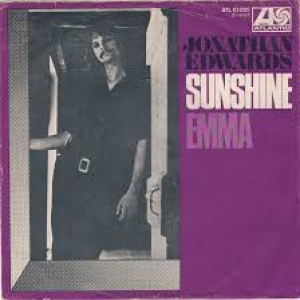
"Sunshine" is a country folk song from 1971 by Jonathan Edwards, released as the first single from his debut album Jonathan Edwards. The single reached No. 4 on the Billboard Hot 100 chart on January 15, 1972, and earned a gold record.

The discography of American country artist Skeeter Davis contains 32 studio albums, 18 compilation albums, 59 singles, 53 lead singles, six collaborative singles, two other charted songs and two additional appearances. Davis was first one half of the duo, The Davis Sisters before embarking on a solo career with the RCA Victor label. Her second single was 1957's "Lost to a Geisha Girl", which reached the top 15 of the American Billboard Hot Country Songs chart. It was followed in 1959 by the top five country selection, "Set Him Free". The same year, Davis's debut studio album was issued on RCA Victor titled I'll Sing You a Song and Harmonize Too. Her career momentum continued to build in 1960 with two top five back-to-back singles: "(I Can't Help You) I'm Falling Too" and "My Last Date ". Both selections also climbed into the Billboard Hot 100 top 40. They were featured on Davis's second studio album called Here's the Answer. Between 1961 and 1962, Davis had top ten Billboard country singles with "Optimistic" and "Where I Ought to Be".

"Stop and Smell the Roses" is a 1974 song by the American singer-songwriter Mac Davis. The song was written by Davis and the noted bandleader and trumpeter Doc Severinsen.

"One Hell of a Woman" is a 1974 song by the American singer-songwriter Mac Davis. The song was written by Davis and Mark James.
"Danny's Song" is a song written by American singer-songwriter Kenny Loggins, as a gift for his brother Danny for the birth of his son, Colin. It first appeared on an album by Gator Creek and a year later on the album Sittin' In, the debut album by Loggins and Messina. The song is well remembered for both the Loggins and Messina original, as well as for Anne Murray's 1972 top-ten-charting cover.
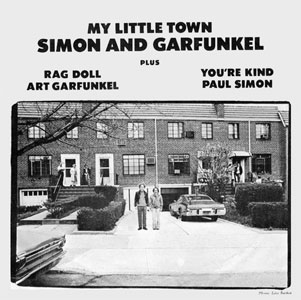
"My Little Town" is a 1975 song by the American duo Simon & Garfunkel. It was written by Paul Simon, who produced the track along with Art Garfunkel and Phil Ramone. The song was included on the 1975 solo releases from both Simon and Garfunkel (Breakaway). It would not appear on any of the duo's albums until the 1997 anthology box set Old Friends and the 1999 compilation album The Best of Simon and Garfunkel. It was the first single release credited to the duo since the 1972 release of "America", released in conjunction with Simon and Garfunkel's Greatest Hits.

"She's All I Got" is a song written by Gary U.S. Bonds and Jerry Williams Jr. It has been recorded by several artists. The first version, released in 1971 by Freddie North, was a Top 40 U.S. pop hit, and a version by Johnny Paycheck was a number 2 U.S. country hit that same year. A second country music version was released on Conway Twitty's 1972 Decca LP I Can't See Me Without You. There was also a version titled "He's All I Got" that was on Tanya Tucker's 1972 album Delta Dawn. Yet another cover titled "Don't Take Her She's All I've Got" was released by Tracy Byrd, whose version reached number 4 on the U.S. and Canadian country singles charts. Co-author Jerry Williams Jr., aka Swamp Dogg, released his own version on his 2020 album Sorry You Couldn’t Make It.

"Watching Scotty Grow" is a song written by country music singer-songwriter Mac Davis and recorded by Bobby Goldsboro in 1970 on his album, We Gotta Start Lovin. Davis recorded his version on his 1971 album, I Believe in Music.
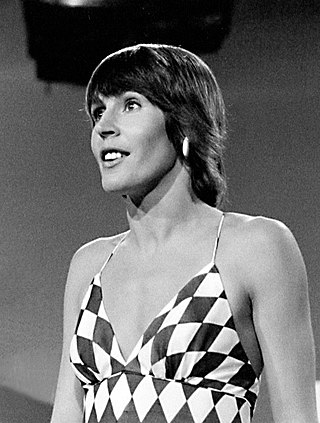
Australian-American singer Helen Reddy (1941–2020), often referred to as the "Queen of 70s Pop", recorded 18 studio albums, seven of which have achieved sales of 500,000 units in the US for which they were awarded Gold certification by the Recording Industry Association of America. One of those seven, I Am Woman, eventually went Platinum by reaching sales of one million copies, and her first compilation album, Helen Reddy's Greatest Hits, was awarded Double Platinum status in 1992 for hitting the two million sales mark. The respective US and Canadian album charts in Billboard and RPM magazine each had appearances by 10 of these LPs during the 1970s.
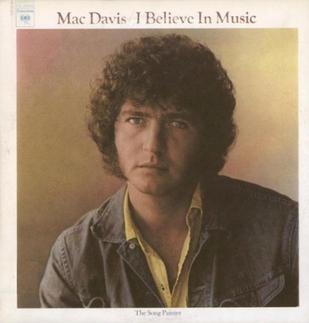
I Believe in Music is the second album released by singer-songwriter and actor Mac Davis. It was released in 1971, although the title song had already charted in 1970. The title track went on to become a standard and was covered by many artists in the 1970s, including a top 30 pop hit by Gallery in 1972.

"Daddy Don't You Walk So Fast" is a song written by Peter Callander and Geoff Stephens and performed by Wayne Newton. It appeared on Newton's 1972 album, Daddy Don't You Walk So Fast.

"Never Ending Song of Love" is a song written by Delaney Bramlett, and, according to some sources, by his wife Bonnie Bramlett. It was originally recorded with their band, Delaney & Bonnie & Friends, in 1971 on the album Motel Shot. Released as a single by Atco Records the same year, "Never Ending Song of Love" became Delaney & Bonnie's greatest hit on the pop charts, reaching a peak of No. 13 on the Billboard Hot 100 and No. 8 on Easy Listening. It reached No. 16 in Australia.
Mac Davis was an American country pop artist. His discography consists of 19 studio albums and 38 singles. Thirty of those singles charted on the U.S. Billboard Hot Country Songs chart between 1970 and 1986. He is best known for the song "Baby Don't Get Hooked on Me." While it wasn't a big hit on country radio stations, it reached No. 1 on both the Billboard Hot 100 and Easy Listening charts in September 1972, spending three weeks atop each. The magazine ranked it as the No. 8 song of 1972.
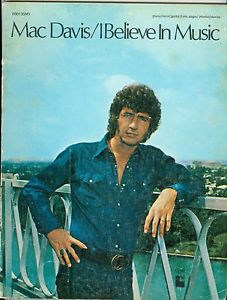
"I Believe in Music" is a 1970 song written and recorded by Mac Davis and later included on his second album I Believe in Music. Gallery covered it in 1972 as the second of three singles off their Nice to Be with You album and the follow-up release to their title track.
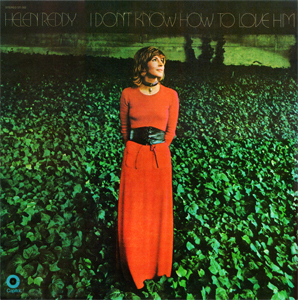
I Don't Know How to Love Him is the debut studio album by Australian-American pop singer Helen Reddy, released on May 10, 1971, by Capitol Records. I Don't Know How to Love Him included her first recording of "I Am Woman". The album made its first appearance on Billboard magazine's Top LP's chart in the issue dated June 5, 1971, and remained there for 37 weeks, peaking at number 100, and got as high as number 40 on the album chart in Canada's RPM magazine. On November 27, 1974, the album received Gold certification from the Recording Industry Association of America, and on March 29, 2005, it was released for the first time on compact disc as one of two albums on one CD, the other album being Reddy's eponymous follow-up that originally came out in the fall of 1971.
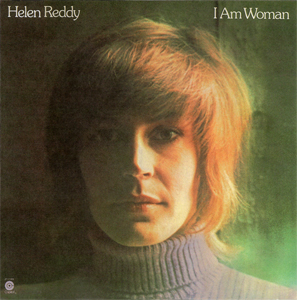
I Am Woman is the third studio album by Australian–American pop singer Helen Reddy, released on 13 November 1972, by Capitol Records. The album included her second recording of the song that gave the album its name, which was also the version that spent a week at number one on the Billboard Hot 100.


















